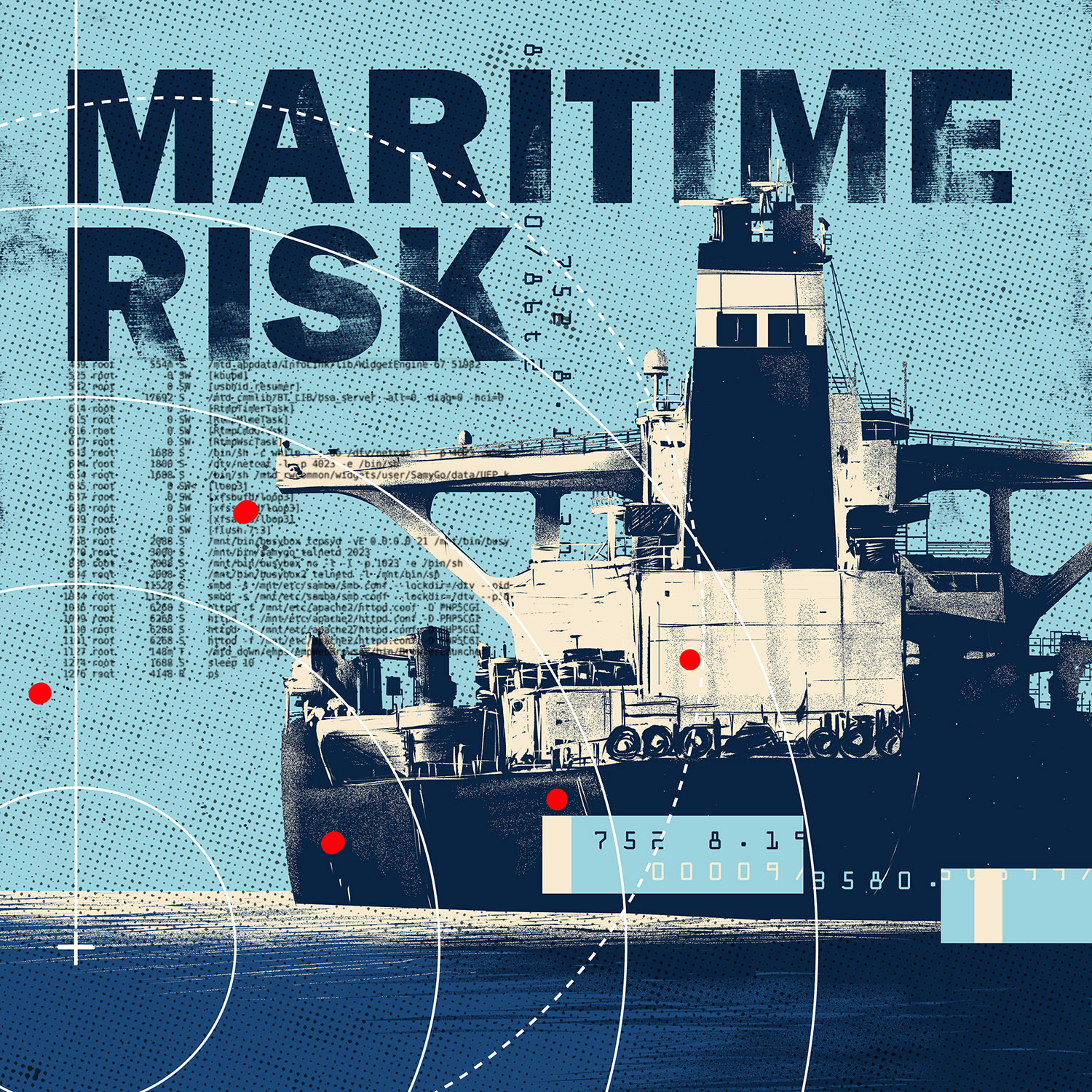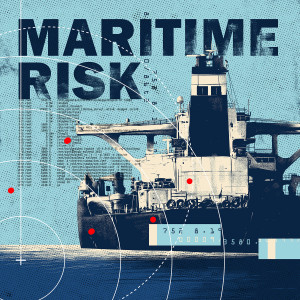
14.9K
Downloads
46
Episodes
Join Shoreline Maritime Answers as we explore the dark side of life at sea, from cyber attacks and drug smuggling to geopolitical risk and migration. On each episode we’ll deep dive into the issues facing shipowners and crew at sea, with specialists in cyber, risk and humanitarian issues.
Episodes

Friday Dec 22, 2023
Episode 26 - The Rising Threat of Drone Attacks at Sea
Friday Dec 22, 2023
Friday Dec 22, 2023
Mr Sallay is the Chief Executive Officer and Co-founder of Reperion. He is an entrepreneur who has founded and headed up companies and projects in Asia for over 15 years across B2B enterprise services, Offshore Oil & Gas Services, and Maritime Transport. Most recently, he has worked with several technology start-ups and ventures raising in excess of US$20 million. He gained an MBA from the University of Chicago and his BA from Swarthmore College, USA.
Jessie is a Senior Writer at Reperion, for whom she has written articles relating to maritime cybersecurity, published in The Maritime Executive and Hellenic Shipping News. She is also a Cyber Security (TIPS-at-Scale) CDT (PhD) candidate at University of Bath and University of Bristol, where she researches cyber attacks against space infrastructure. She enjoys public advocacy and has taught undergraduate International Relations seminars.

Monday Dec 11, 2023
Monday Dec 11, 2023
🎙️ Dive into the intriguing world of maritime cyber security with our latest Maritime Risk Podcast episode! Join us as we welcome Professor Stephen McCombie, an esteemed expert with a rich tapestry of experience spanning policing, academia, and the frontlines of cybercrime and digital forensics.
In this captivating conversation, Stephen unveils the hidden depths of maritime cyber threats, sharing insights from his groundbreaking research and the development of the Maritime Cyber-Attack Database (MCAD).
Discover the shocking realities of cyber-attacks on the high seas today, from NATO ship location spoofing to ransomware incidents that have rocked the maritime industry.
Whether you're a cyber security aficionado, maritime enthusiast, or simply curious about maritime cyber threats, this episode is a must-listen.
Tune in to Episode 25 of Shoreline’s Maritime Risk Podcast and embark on a voyage into the digital unknown – it's an episode you won't want to miss! 🚢💻
Download the MCAD App -

Monday Sep 25, 2023
Special Edition - Episode 3 - Caught in the Eye of the Regulatory Storm
Monday Sep 25, 2023
Monday Sep 25, 2023
The episode rounds off our short series of educational podcasts which have been recorded to provide our listeners with a deeper understanding of our new MDCI product.
In this the final episode we learn from the lifelong professional experience of George Chalos when defending shipowners and their crews before the U.S. courts and speaks to the value of the legal services we have embedded within the MDCI policy.
Our listeners are walked through a typical claim scenario and will be left in no doubt why it is important for shipowners and their crews to have recourse to the right help and advice when subject to the rigors an expanded USCG PSC MARPOL investigation in the U.S.

Monday Sep 25, 2023
Monday Sep 25, 2023
In this podcast episode, we invite you to explore the detailed benefits, policy limits, and how you can integrate MDCI into your current Shoreline coverage.
For those listeners new to our insurance solutions, we explain how our flexible premium models are tailored to accommodate your vessel's unique attributes.
Listen now, to discover how MDCI can serve as your protective shield against the risks associated with MARPOL prosecutions in the U.S., that have persisted for the past two decades.

Monday Sep 25, 2023
Monday Sep 25, 2023
In this very special episode of Shoreline’s Maritime Risk Podcast, we are excited to introduce a new insurance solution, namely, MDCI, which has been carefully crafted to address one of the most pressing challenges for ship owners and their crew trading their vessels to the U.S. today.
After a year of research and collaboration with industry experts, maritime lawyers and marine reinsures at Lloyd’s, we are thrilled to unveil this essential new coverage which will bridge the gap in an owner’s P&I cover when facing allegations of MARPOL violations in the U.S.
Dive in as we uncover the backstory, the need, and the value of this groundbreaking insurance product.

Wednesday Jun 28, 2023
Wednesday Jun 28, 2023
In this episode of Shoreline’s Maritime Risk Podcast, we discuss the main incentives and commercial goals driving hackers to target the maritime industry. We unravel how high-profile incidents, such as the Ever Given's Suez Canal blockage, have created newfound incentives for hackers to exploit vulnerabilities within the sector. Additionally, we uncover the emerging role of AI, specifically ChatGPT, in assisting hackers with sophisticated phishing email campaigns, leading to potential breaches in vessel security.
The potential consequences of cyberattacks on vessels' navigational control and network infrastructure are thoroughly scrutinized, illuminating the alarming risks associated with these malicious activities. Fear not, however, as our experts share effective strategies and essential measures for mitigating cyber threats in the maritime industry.
Finally, we examine the ethical considerations and challenges stemming from hackers' use of AI for criminal activities, shedding light on the responsibility of AI developers and technology providers in preventing misuse.
Podcast Guests:
Jessie is a Senior Writer at Reperion, for whom she has written articles relating to maritime cybersecurity, published in The Maritime Executive and Hellenic Shipping News. She is also a Cyber Security (TIPS-at-Scale) CDT (PhD) candidate at University of Bath and University of Bristol, where she researches cyber attacks against space infrastructure. She enjoys public advocacy and has taught undergraduate International Relations seminars.
Mr Sallay is the Chief Executive Officer and Co-founder of Reperion. He is an entrepreneur who has founded and headed up companies and projects in Asia for over 15 years across B2B enterprise services, Offshore Oil & Gas Services, and Maritime Transport. Most recently, he has worked with several technology start-ups and ventures raising in excess of US$20 million. He gained an MBA from the University of Chicago and his BA from Swarthmore College, USA.
Dr. Dmitry Mikhaylov
Dr. Mikhaylov, Chief Scientific Officer and Co-founder of Reperion, is a cybersecurity thought leader and academic. An official United Nations Expert, he obtained his PhD in Artificial Intelligence and an MBA from University of Warwick. He has co-authored 10 books and has taught or conducted research at 3 universities in the fields of cybersecurity and artificial intelligence. Most recently, Dmitry served as a Visiting Associate Professor at National University of Singapore (NUS Enterprise) and is head of research at the Abu Dhabi Maritime Academy.

Tuesday Apr 18, 2023
Episode 20 - Half of maritime incidents in 2022 occurred in ports and terminals
Tuesday Apr 18, 2023
Tuesday Apr 18, 2023
Welcome to the latest episode of Shoreline’s Maritime Risk Podcast, in this episode we discuss an alarming statistic from the maritime industry.
According to a report by RightShip, an Environmental, Social and Governance (ESG)-focused digital maritime platform, half of the maritime incidents recorded in 2022 occurred in ports and terminals. This data was collected from various sources, including PSC, MOUs, classification societies, flag states, shipowners and managers self-reporting. The report states that 2,400 incidents were recorded in 2022 where the location was recorded.
Yucel Yildiz, RightShip’s Port and Terminal Manager, expressed concern over this statistic and emphasized the need for harbour masters and operations teams to be prepared to deal with issues as they occur.
In this episode, we will explore the implications of this data and discuss how increased transparency over loss data can help the marine industry manage and minimize risks at sea and in port.

Tuesday Mar 07, 2023
Episode 19 - Seafarer Abandonment – How can we best use the data?
Tuesday Mar 07, 2023
Tuesday Mar 07, 2023
In this episode of the Shoreline Maritime Risk Podcast, we have the pleasure of speaking with Andrew Roberts of RightShip.
Rightship represents itself to be the world’s leading Environmental, Social and Governance (ESG) focused digital maritime platform, providing expertise in global safety, sustainability, and social responsibility practices.
Consequently, we were confident they would be the right people to speak to about the issue of seafarer abandonment and how the use of data they have collected over the years on this difficult subject area can be put to best use, resulting in zero harm outcomes for those working at sea today.
We were not wrong, the conversation that ensued was both enlightening and disturbing in equal measure.

Tuesday Feb 07, 2023
Tuesday Feb 07, 2023
In this episode we have the pleasure of speaking with Max Boby’s once again, Max leads Hudson Cyber, a division of HudsonAnalytix.
Hudson has 30 years’ experience in the US oil spill response space and now see many parallels between oil spill response and the ever-evolving needs for a well structured and supported cyber response plan for vessels entering US waters.
They recently launched their Cyber IQ service which is a play on the role of the QI (Qualified Individual) in the oil spill response scenario and we were eager to hear how this service can help shipowners with their cyber regulatory and operational compliance in the US today.

Thursday Sep 22, 2022
Thursday Sep 22, 2022
The depth of analytical insight and provision of ‘actionable intelligence' in the maritime domain has evolved considerably over the last few years. This has been made possible by the availability and accessibility of data sources and the involvement of data scientists and machine learning engineers to make sense of it. In this episode of Shoreline’s Maritime Risk Podcast, Shoreline consultant Nick Maddalena is joined by Brendan Moore and Eric Anderson from Synmax, a satellite data analytics company based in Houston and London. We discuss the dramatic evolution of the commercial satellite industry, how those changes have delivered deep insights into shipping activity and the maritime domain as a whole.
- Brendan Moore has spent almost 18 years working within the Intelligence field, combatting organised crime for the UK government across drugs importation, firearms and cyber. He has taken this expertise in intelligence and tackling criminality into SynMax as CEO.
- Eric Anderson is Synmax’s Chief Technology Officer. Prior to joining Synmax, Eric worked in the energy trading industry for 10 years, most recently as a Quantitative Analyst developing models used for commodities trading. At Synmax he leads a highly skilled team of Data Scientists, Machine Learning Engineers and GIS Engineers from a diverse set of industry backgrounds including financial trading, energy and earth observation.
